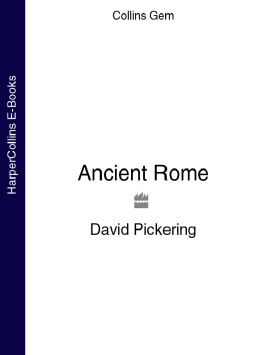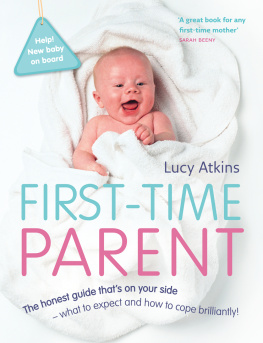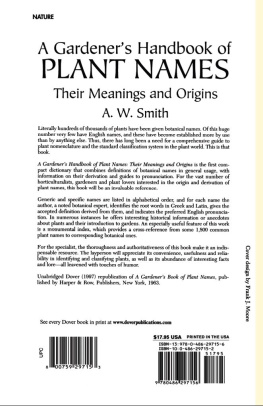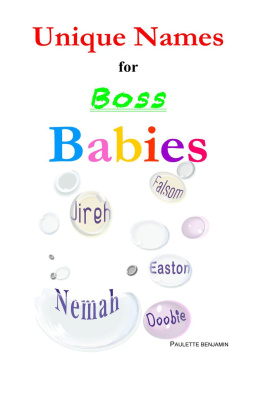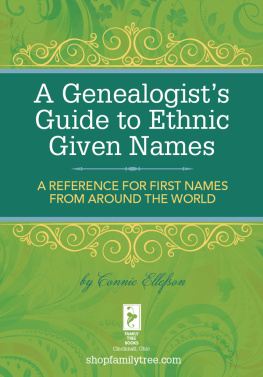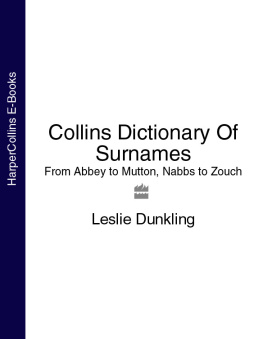PENGUIN REFERENCE
The Penguin Pocket Dictionary of Babies Names
David Pickering graduated in English from St Peters College, Oxford. An experienced reference books compiler, he has contributed to (and often been sole author and editor of) some 150 reference books, mostly in the areas of the arts, language, local history and popular interest. These include a Dictionary of Theatre (1988), an Encyclopedia of Pantomime (1993), Brewers Twentieth-Century Music (1994; 1997), a Dictionary of Superstitions (1995) and a Dictionary of Witchcraft (1996). He lives in Buckingham with his wife and two sons.
THE PENGUIN POCKET DICTIONARY OF BABIES NAMES
David Pickering

PENGUIN BOOKS
PENGUIN BOOKS
Published by the Penguin Group
Penguin Books Ltd, 80 Strand, London WC2R 0RL , England
Penguin Group (USA) Inc., 375 Hudson Street, New York, New York 10014, USA
Penguin Group (Canada), 10 Alcorn Avenue, Toronto, Ontario, Canada M4V 3B2 (a division of Pearson Penguin Canada Inc.)
Penguin Ireland, 25 St Stephens Green, Dublin 2, Ireland (a division of Penguin Books Ltd)
Penguin Group (Australia), 250 Camberwell Road, Camberwell, Victoria 3124, Australia (a division of Pearson Australia Group Pty Ltd)
Penguin Books India Pvt Ltd, 11 Community Centre, Panchsheel Park, New Delhi 110 017, India
Penguin Group (NZ), cnr Airborne and Rosedale Roads, Albany, Auckland 1310, New Zealand (a division of Pearson New Zealand Ltd)
Penguin Books (South Africa) (Pty) Ltd, 24 Sturdee Avenue, Rosebank 2196, South Africa
Penguin Books Ltd, Registered Offices: 80 Strand, London WC2R 0RL , England
www.penguin.com
The Penguin Dictionary of First Names first published 1999
Revised edition published 2004
This abridged edition published as The Penguin Pocket Dictionary of Babies Names 2005
Copyright David Pickering, 1999, 2004, 2005
All rights reserved
The moral right of the author has been asserted
Except in the United States of America, this book is sold subject to the condition that it shall not, by way of trade or otherwise, be lent, re-sold, hired out, or otherwise circulated without the publishers prior consent in any form of binding or cover other than that in which it is published and without a similar condition including this condition being imposed on the subsequent purchaser
ISBN: 978-0-14-191639-2
CONTENTS
INTRODUCTION
Choosing a name for a baby is a matter most new parents naturally take very seriously. After all, a persons name can affect their whole life and career, and an inappropriate choice may cause lasting embarrassment or difficulty whatever that persons age or other qualities. A fanciful or frivolous name, for example, may suggest a likeable, cheerful nature but is not likely to promote a persons chances of being taken seriously, while a plainer, monosyllabic name might.
A persons name is a stamp of their individuality, though in reality it may well say more about the parents prejudices, class background or social pretensions than it does about the bearer. People tend to make instant judgements about strangers based on names, although these judgements may be modified later. Children in particular may focus on unusual names in order to emphasize their own unique personality or make fun of others. Some names fit in in certain regions or communities, but would look out of place elsewhere. Others change with fashion, being in vogue with one generation, but old-fashioned to the next (although they may well come back into fashion years later).
Examination of the lists of newly registered first names published by various government agencies around the English-speaking world each year reveals much about trends and changing tastes in the naming of children. Even the most cursory study of these records shows how contemporary parents continue to be divided between traditional choices that have been popular for generations and newer coinages, typically ones that have been promoted in various branches of the media. Thus, lists of the most popular names over the past few years have been dominated not only by such well-established choices as Jack, James, Charlotte and Emma but also by such new or rediscovered names as Callum, Oliver, Chloe and Jessica.
Modern parents seem to be more conservative in naming their sons than they are in naming their daughters. According to the records for the year 2002 some 2,430 different boys names were registered, considerably fewer than the 3,089 names selected for girls. Many of the choices themselves have, however, been far from conservative. Several long-standing favourites for both sexes, which might have been expected to remain top choices for years to come, have recently gone into substantial decline, notable amongst them such examples as David (ending some 50 years as one of the top 10 favourite choices) and Sarah. Also languishing in the lower reaches of the tables are such former staples as Robert, Andrew, John, Susan and Alexandra. Other names that were briefly at a peak a decade ago (among them Jason, Kylie, Chelsea and Imogen) have returned to relative obscurity. Only time will tell if a similar fate awaits Ethan, Tyler, Maisie, Willow and the other recently emerged choices that have taken their place.
Parents continue to range widely for inspiration. While names from the Bible (Joshua, Matthew, Rebecca, etc) continue to play a significant role, many of the other names in the lists appear to reflect the influence of contemporary society, with bursts of interest in names borne by top sports players, film stars, fictional characters and so forth. In the last couple of years television has provided several popular choices, including the girls name Chardonnay, as featured in the drama series Footballers Wives, and Alfie, familiar from the BBC soap opera EastEnders, while the cinema has suggested, among others, Angelina (after actress Angelina Jolie), Erin (from the film Erin Brockovich) and Maximus (after the name of the hero in Gladiator). Childrens literature has inspired a renewal of interest in the old favourite Harry (as a result of the success of the Harry Potter stories) and in politics the birth of the prime ministers son Leo Blair focused the spotlight on another previously neglected name.
Imitation being the sincerest form of flattery, many people have followed the lead of various celebrities in taking up the names the famous select for their own children. Highlights in this category have included Brooklyn and Romeo (as bestowed upon David and Victoria Beckhams two sons), Dylan (the name of Catherine Zeta-Joness first child) and Mia (the name of Kate Winslets daughter).
A natural conservatism has, however, continued to exert itself with regard to more outlandish choices and parents seem to have been on the whole reluctant to accept the baton proffered by the late Paula Yates, who named her four daughters Fifi Trixibelle, Peaches, Pixie and Heavenly Hiraani Tiger Lily. Other recently recorded names that seem destined to remain unique include those of three Brazilian sisters who were called Xerox, Photocopier and Authenticated (reportedly because their birth resulted from a romp on a photocopying machine) and the British baby girl born in the 1990s with the name Room 21A (named apparently for similar reasons).
Lists of the most popular first names from different parts of the English-speaking world reveal the extent to which first names appear to be becoming increasingly universal, perhaps through the influence of the international media. There remain, however, some regional favourites, examples including Cameron, Ryan and Caitlin in Scotland, Brandon and Taylor in the USA and Lachlan and Liam in Australia. If richness of choice is to be preserved through the new century such divergences are only to be welcomed.
Next page


